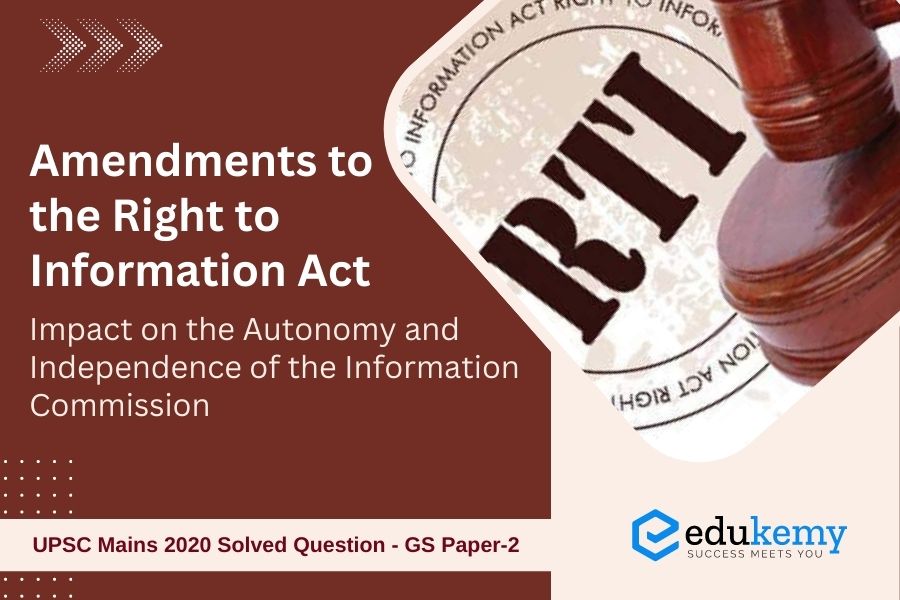The recent amendments to the Right to Information Act mark a significant shift in the landscape of transparency and accountability. While proponents argue that these changes aim to streamline the functioning of the Information Commission, critics express concerns over their potential adverse effects on the autonomy and independence of the Commission. The alterations, which include modifications to the tenure and terms of service of Information Commissioners, raise apprehensions about political interference and compromise the Commission’s ability to act as an impartial adjudicator in disputes related to the disclosure of information. The RTI Act, a crucial tool in fostering a culture of openness and ensuring government accountability, faces a delicate balancing act as policymakers navigate between efficiency and preserving the integrity of the Information Commission. It remains imperative for the stakeholders to engage in a thoughtful and inclusive dialogue to address these concerns and safeguard the fundamental principles that underlie the right to information.
UPSC Mains General Studies Paper – 2 Mains 2020
Statutory, Regulatory, and Various Quasi-Judicial Bodies
UPSC Mains Civil Services IAS Exam Question Paper – 2020
Contents
- 1 Structure of the Question
- 2 Answer
- 3 Conclusion
- 4 Frequently Asked Questions (FAQs)
- 4.1 1. What are the recent amendments to the Right to Information Act, and how do they impact the autonomy of the Information Commission?
- 4.2 2. How do the amendments affect the appointment process of Information Commissioners, and what implications does this have for their autonomy?
- 4.3 3. In what ways do the recent amendments address the functioning and powers of the Information Commission, and how might this impact its autonomy?
- 4.4 4. How do the amendments address the issue of term limits for Information Commissioners, and what are the potential consequences for their independence?
- 4.5 5. What safeguards, if any, have been put in place to ensure the continued autonomy of the Information Commission despite the recent amendments?
- 5 In case you still have your doubts, contact us on 9811333901.
Structure of the Question
- In Introduction,
- Try to write about the Right to Information Act (RTI) along with its importance.
- In Body,
- Mention recent Amendments to the Right to Information Act.
- Write the impact of Amendments on the Information Commission.
- Conclude with the Importance of the RTI Act in participatory democracy.
Answer
Introduction
The Right to Information Act is considered to be one of the most successful laws in India. The basic objective behind the Right to Information (RTI) Act was to empower the citizens, promote transparency and accountability in the working of the Government, contain corruption, and make our democracy work for the people in a real sense.
Changes made in the RTI (Amendment) Act, 2019
- The Chief Information Commissioner (CIC) (at the federal and state levels) is appointed for a five-year term under the RTI Act of 2005. The Amended Act eliminates this provision and instead specifies that the Union government will notify the CIC and ICs of their terms of office.
- According to the RTI Act of 2005, the salaries of the CIC and IC (at the national level) will be equal to the salaries of the Chief Election Commissioner and Election Commissioners. The modified Act repeals these clauses and provides that the Central and State CICs and ICs’ wages, allowances, and other terms and conditions of employment shall be established by the Central government.
- The 2005 Act states that at the time of appointment of the CIC and ICs (at the Central and state levels), if they are receiving pensions or any other retirement benefits for the previous government services, their salary will be reduced by an amount equal to the pension. The 2019 amended Act removed this provision.
Impact of Amendments
- The amendment allows the interference of the executive in the functioning of information commissions which are quasi-judicial bodies. This may affect the doctrine of separation of powers, which underscores this independence and is vital to our democratic checks and balances.
- Apart from this, the amendment also affects the constitutional principles of federalism, as now the Central government can change the terms of service of the state Information Commission.
- The amendment has the potential to make access to information difficult. Easy and quick access to information is vital to ensure the accountability of the representatives and the state.
- Unilateral power of the central government will lead to centralization of power, which is not conducive to the exercise of freedom of expression.
Conclusion
The 2nd ARC held that RTI is the master key to governance as it checks the misuse and arbitrariness of power and corrupt governance. Therefore, in the pursuit of good governance, the RTI Act requires strengthening of the provisions.
Frequently Asked Questions (FAQs)
1. What are the recent amendments to the Right to Information Act, and how do they impact the autonomy of the Information Commission?
The recent amendments to the Right to Information Act are designed to streamline the functioning of the Information Commission. These changes include alterations in the selection and removal process of Information Commissioners. Understanding the specifics of these amendments is crucial to gauge their potential impact on the autonomy and independence of the Information Commission.
2. How do the amendments affect the appointment process of Information Commissioners, and what implications does this have for their autonomy?
The amendments introduce changes in the appointment process of Information Commissioners, potentially impacting their independence. It is important to delve into the details of these alterations to comprehend how they may influence the selection of commissioners and, consequently, their ability to function autonomously.
3. In what ways do the recent amendments address the functioning and powers of the Information Commission, and how might this impact its autonomy?
The amendments likely touch upon the powers and functioning of the Information Commission. Understanding the specifics of these changes is essential to evaluate how they may enhance or compromise the autonomy of the Commission in carrying out its responsibilities related to the Right to Information.
4. How do the amendments address the issue of term limits for Information Commissioners, and what are the potential consequences for their independence?
Term limits play a significant role in determining the independence of officials. The recent amendments may introduce changes in the term limits for Information Commissioners, and it is vital to explore the implications of such modifications on their independence and ability to make impartial decisions.
5. What safeguards, if any, have been put in place to ensure the continued autonomy of the Information Commission despite the recent amendments?
Examining the amendments critically involves identifying any safeguards or provisions that aim to preserve the autonomy of the Information Commission. Analyzing these safeguards is crucial for assessing whether the amendments strike a balance between enhancing efficiency and maintaining the Commission’s
In case you still have your doubts, contact us on 9811333901.
For UPSC Prelims Resources, Click here
For Daily Updates and Study Material:
Join our Telegram Channel – Edukemy for IAS
- 1. Learn through Videos – here
- 2. Be Exam Ready by Practicing Daily MCQs – here
- 3. Daily Newsletter – Get all your Current Affairs Covered – here
- 4. Mains Answer Writing Practice – here



